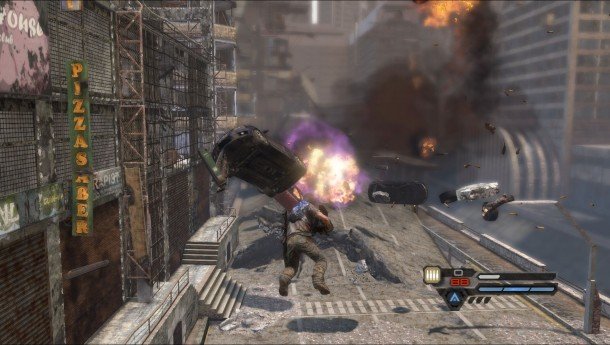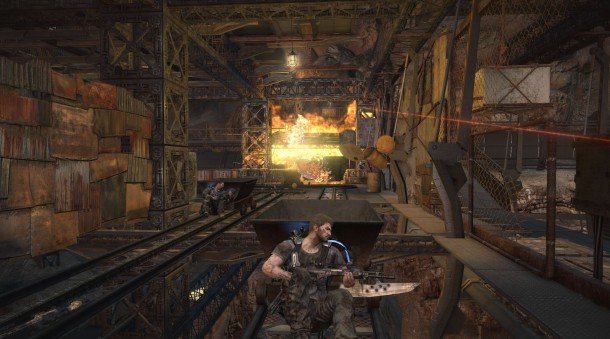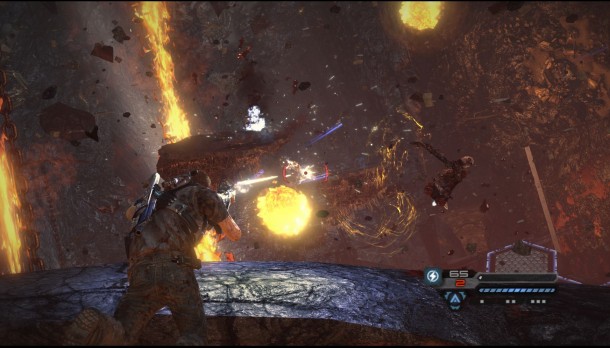Our Verdict
Inversion is a heavily linear, by-the-numbers cover shooter that fails to make the most of its few high points.
PC Gamer's got your back
This article originally appeared is issue 244 of PC Gamer UK.
"Use cover to avoid fire.” That was the first in-game tip that Inversion gave me, and it explains the game more succinctly than I could hope to. It's a third-person shooter in the Gears of War vein, set in a generic American city attacked by primitive cultists. You move between areas full of waist-high walls, duck behind them, kill everything in the room, then run (or, more accurately, waddle-sprint) to the next. Sometimes there's a turret section – you know, just to spice things up.
Those cultists carry Inversion's one twist: they speak like cavemen, but they carry weapons that control gravity. Early on, you get a Gravlink device that fires a field of energy, reducing (and later, increasing) the gravity on anything inside it. In combat, the Gravlink's applications are limited to floating enemies up out of cover, flinging explosive barrels about and dropping crates from above (in the few areas where the game explicitly outlines you can).

The combat is decent and the execution slick, but the rigidity of the linear progression is painfully transparent. Environmental puzzles are always accompanied by your AI partner shouting something like “WE NEED TO MOVE THAT PLATFORM SOMEHOW!” The game trusts you just enough to not say outright that the 'somehow' refers to the device whose sole purpose is moving things.
Gravity also plays a part in how you manoeuvre through the world. This is best realised by the gravity wells that flip your perspective to fight on walls. The spectacle of battling down the side of a building as the ground looms ahead, the road swarming with warring soldiers, is impressive. It's also a completely wasted opportunity. I counted two occasions in the game's six-and-a-bit hours where the scale of multi-sided combat was genuinely exciting.
More frequently the gravity gimmick is explored through tedious zero-g set-pieces. You propel yourself through floating bits of cover, shooting and chucking objects at enemies, desperately hoping they don't get near, because the controls during these sections aren't responsive enough to allow you to deal with close-range encounters.

When you're not hiding behind walls, crates and tables, you're watching a cutscene. Inversion's story is foisted on you constantly. Each completed area triggers more po-faced dialogue about the invasion of gravity-controlling savages, robots, your missing daughter and... Oh God, why won't they just shut up?
The heavy-handed resistance fighter clichés eventually shift into more agreeable heavy-handed sci-fi fluff, but Inversion mars its average combat with repetition, continual player shepherding and a bullish determination to break up its flow.
It's also hard to recommend at full price, with completely forgettable multiplayer deathmatches doing little to extend the short campaign.
Inversion is a heavily linear, by-the-numbers cover shooter that fails to make the most of its few high points.

Phil has been writing for PC Gamer for nearly a decade, starting out as a freelance writer covering everything from free games to MMOs. He eventually joined full-time as a news writer, before moving to the magazine to review immersive sims, RPGs and Hitman games. Now he leads PC Gamer's UK team, but still sometimes finds the time to write about his ongoing obsessions with Destiny 2, GTA Online and Apex Legends. When he's not levelling up battle passes, he's checking out the latest tactics game or dipping back into Guild Wars 2. He's largely responsible for the whole Tub Geralt thing, but still isn't sorry.


